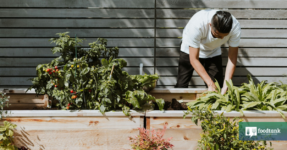
Cultivate Food Sovereignty in Your Home Garden with these Resources – Food Tank
A version of this piece was featured in Food Tank’s newsletter, released weekly on Thursdays. To make sure it lands straight in your inbox and to be among the first to receive it, subscribe now by clicking here.
Every spring, I find much solace and purpose in gardening.
This has only been magnified over the past four years. Today, on Leap Day, I’m reflecting on the last time our calendar showed February 29: I’d just returned from visiting friends out of town. I had a nice dinner here in Baltimore with my husband. We knew Covid-19 was out there, but we had no idea of the scale of devastation that the pandemic would bring to our communities and the food system.
Especially in recent years, spending time with my hands in the soil—tending to seeds and seedlings—can feel beautiful and almost spiritual. We’re participating in rebirth, in building a greener world, and in becoming more connected with our food. This feels more urgent now than ever.
And anyone who gardens or farms knows there’s no sugarcoating it: Growing plants is hard work!
Lately, I’ve been getting into the gardening mindset and spending time setting things up for the growing season. My husband makes fun of me: During these last chilly few weeks here, I completely take over our dining room table to start seedlings before transplanting them to the soil outside!
I want to share with you some of the gardening, farming, and land-based books I’ve been reading that have provided hands-on guidance to growing food more regeneratively and sustainably:
A Year Full of Veg: A Harvest for All Seasons by Sarah Raven
Braiding Sweetgrass by Robin Wall Kimmerer
Farming While Black by Leah Penniman
Held by the Land: A Guide to Indigenous Plants for Wellness by Leigh Joseph
How to Garden When You Rent by Matthew Pottage
Into the Weeds: How to Garden Like a Forager by Tama Matsuoka Wong
Many Hands Make A Farm: 47 Years of Questioning Authority, Feeding a Community, and Building an Organic Movement by Jack Kittredge and Julie Rawson
Resilient Garden: Sustainable Gardening for a Changing Climate by Tom Massey
The Modern Gardener by Frances Tophill
The Regenerative Garden: 80 Practical Projects for Creating a Self-sustaining Garden Ecosystem by Stephanie Rose
Veg in One Bed: How to Grow an Abundance of Food in One Raised Bed, Month by Month by Huw Richards
Of course, there are countless more books on my shelf I could recommend. To read more about Indigenous cultivation, check out Iwigara: American Indian Ethnobotanical Traditions and Science by Enrique Salmón. Organic grower Claire Ratinon writes beautifully in Unearthed: On Race and Roots, and How the Soil Taught Me I Belong, as does Alice Vincent in Why Women Grow.
And reading books together is a great way for families to prepare for the growing season, too! Let’s shout out some of our favorite books to get kids of all ages excited and involved in the growing process:
A Year in Our New Garden by Gerda Muller
Farmer Will Allen and the Growing Table by Jacqueline Briggs Martin, illustrated by Eric-Shabazz Larkin
Grow a Garden! by Alexis Frederick-Frost
In the Garden by Emma Giuliani
Jayden’s Impossible Garden by Mélina Mangal, illustrated by Ken Daley
The No-Dig Children’s Gardening Book: Easy and Fun Family Gardening by Charles Dowding, illustrated by Kristyna Litten
One reason why growing some of your own food is so important is the idea of food sovereignty—when communities have direct control over their food supply and the types of crops they’re producing. It’s crucial toward building alternative food networks that don’t rely on industrial practices that degrade the planet.
As I wrote in this newsletter last year, seed-saving and seed sovereignty today protects food systems tomorrow.
By being intentional about where we source our seeds, home gardeners can make significant contributions to local food sovereignty and seed diversity! Finding community seed-savers in your neighborhood is awesome, and there are many inspiring producers working to provide good seeds:
Southern Exposure Seed Exchange is a cooperatively owned company that works with a network of over 100 small farmers who specialize in heirloom seeds to harness the wisdom of our predecessors. Row 7 Seeds was founded by a group of chefs, farmers, and plant breeders to grow crops that simply taste great. Seed Savers Exchange has been preserving and elevating a diverse range of heirloom seeds for nearly five decades.
Ujamaa Seeds, a project of the Ujamaa Cooperative Farming Alliance (UCFA), is dedicated to providing support and opportunities for seed farmers of color and from historically marginalized backgrounds. And Johnny’s Selected Seeds, a seed producer owned entirely by employees, also runs a variety of community programs and research farms.
Where do you source seeds? We love to highlight success stories of local producers here at Food Tank, and I’d love to hear more about the gardeners and advocates who are helping preserve your community’s unique food heritage. Share their stories with me at danielle@foodtank.com!
Speaking of cultivating a better world: One final reminder to join us this Sunday, March 3, for our Summit on creating policy solutions that prioritize the health and well-being of generations to come.
We’ll be in Durham, North Carolina, alongside Duke University’s World Food Policy Center, and you can join us free virtually alongside senior White House officials and state policymakers, chefs, labor leaders, growers, and more. Grab your spot today by CLICKING HERE!
In the meantime, happy reading—and happy growing!
Articles like the one you just read are made possible through the generosity of Food Tank members. Can we please count on you to be part of our growing movement? Become a member today by clicking here.
Photo courtesy of Priscilla Du Preez, Unsplash



